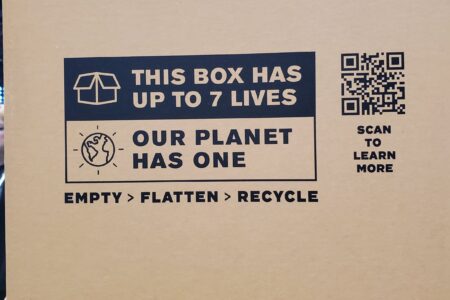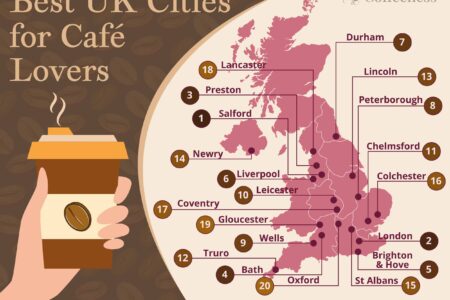Tea and coffee: powerful tools to cope with stress

Credit: (Left) Starbucks, Kerry
“I’m stressed out!” is not something people are just saying today — consumers really are ‘stressed out’. The average American feels like their ‘head is spinning 156 times a year from stress’, according to new research.
A survey of 2,000 adults found that these stress headaches break down to three times a week and that respondents recalled having brain fog just as often. Reviewing their current stress levels, the survey found that 41% said they’re at their peak stress for the year so far. [Although the survey was among Americans, the symptoms and causes of stress are similar across many countries. For example, according to Euromonitor International’s Voice of the Consumer: Health and Nutrition Survey 2021, globally, stress and anxiety now rank as the second most common health concern. Many of the other top reported issues, including sleeping problems and headaches, tend to be closely linked to high stress levels.]
Results of the new online survey – conducted by Talker Research for Traditional Medicinals between July and August 2024 – showed that while 30% are hopeful that their stress level will go down by the end of the year, a quarter of respondents think there’s a chance it’ll go up (26%). Yet, 45% have never taken a mental health day or sick day from work solely because of stress.
Comparing their stress levels to previous years, 38% of those surveyed said that 2024 has been more stressful than 2023, but less so than 2022 and the preceding years.
What is it about this year that is exacerbating their stress levels? Respondents are worried about their finances (35%), the economy (28%) and their physical health (25%). Others are troubled by the news landscape — particularly the 2024 presidential election (20%) and other world issues (19%), both of which I’m surprised are not higher percentages. In terms of how respondents are combatting these high-intensity moments, results showed that a majority feel overwhelmed during these times (58%).
What’s Stressing Americans Out?
- Personal finances — 35%
- The economy — 28%
- Physical health — 25%
- Family — 25%
- Mental health — 24%
- The 2024 presidential election — 20%
- The news/world issues — 19%
- Work — 16%
- An unexpected life event — 15%
- Romantic relationship — 13%
In an exclusive article for T&CTJ, “The caffeine paradox: sleep, anxiety and the endless rise in caffeine consumption,” Matthew Barry, insight manager, food & beverage, Euromonitor International, wrote, “Although consumers’ stress and anxiety levels remain high, their desire for caffeine has not waned. In fact, the demand for higher caffeine products is actually rising.”
How can these two clear trends coexist? Why are consumers eager to increase their caffeine consumption while also being concerned with their stress levels and sleep quality? Barry posited that the explanation is found in the caffeine paradox — higher levels of stress and sleep troubles lead, paradoxically, to higher demands for caffeine. “At the core of consumer stress is the desire to accomplish more. And this desire creates more stress, which leads to more caffeine consumption for sufficient energy.”
In the Traditional Medicinals survey, respondents shared that they know they’re stressed when they have trouble sleeping (42%), feel irritable (37%), fatigued (34%), have headaches (33%) or feel worried or paranoid (31%). Other respondents said their stress manifests through an inability to focus (30%), restlessness (29%), racing thoughts (27%), brain fog/mental unclarity (23%), or panic attacks (23%).
“With cold and flu season approaching, self-care and stress management are more important than ever,” said Kristel Corson, chief marketing officer at Traditional Medicinals. “Half of those surveyed believe that stress is often the main cause of them getting sick, and when asked what season is most stressful, the highest percentage of respondents (26%) said winter given seasonal changes and the holidays.”
To combat stress, 47% of respondents turn on some music, while another 39% look for comfort in their favourite TV shows and movies.
Food has its own calming effect, with nearly a fifth of respondents sharing that they have a snack (17%) or drink a cup of tea (14%) when they need to bring their stress down.
Seven in 10 agree that their overall mental health would be better if they were able to reduce their stress (71%), highlighting a need for self-care routines to be an important part of the stress solution.
However, incorporating self-care strategies into their daily life is a hurdle for one in seven Americans, leaving nearly half wishing for simple options that fit into their busy schedule (47%) as opposed to elaborate routines. When thinking about a “de-stressing regimen,” an equal percentage of respondents want long-term overall wellness and the ability to alleviate stress quickly (23% each).
“We believe in integrating ancient herbal wisdom with modern scientific advancements for a holistic approach to wellness,” said Corson. “Just 37% of survey respondents think that trendy stress relief options are successful, while nearly half felt confident in more traditional methods like yoga, meditation, or a calming tea.”
Given the conflict in the Middle East, the Russian/Ukraine war, inflation, high costs of goods, and in the US, back-to-back devasting hurricanes along with a contentious presidential election,
consumers’ stress will not likely abate anytime soon. Furthermore, high-caffeine product launches have not tempered while decaf sales remain sluggish, suggesting that the caffeine paradox, Barry highlighted in the April 2022 article will hold true for the foreseeable future.
Barry concluded the article, noting, “That leaves coffee and tea where they have always been — powerful tools in coping with the larger challenges of life. The underlying stressors of the modern world are beyond the power of the industry to solve. But manufacturers can offer a range of products to help alleviate possible burdens, from those who want as much caffeine as they can consume to those prioritising mindfulness and looking to cut back.”
Tea and coffee manufacturers have done just that. So go ahead and grab that 300+ caffeine RTD coffee, that iced ginseng wild apple mint tea, that lavender coffee latte, or chamomile lavender tea — whatever you fancy, as there’s really no choice.
- Vanessa L Facenda, editor, Tea & Coffee Trade Journal.
Keep in touch via email: [email protected] Twitter: @TCTradeJournal or LinkedIn: Tea & Coffee Trade Journal



